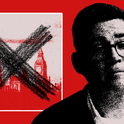Good news in European elections is rare these days. But it’s coming. This Saturday a pro-European, LGBT-rights-supporting, liberal, anti-corruption campaigner and environmental lawyer is the overwhelming favourite to become Slovakia’s next president.
Zuzana Caputova won 40 per cent of the vote in the first round of the presidential election earlier this month—more than twice the votes of her nearest rival. That rival, Maros Sefcovic, is going to struggle to catch up. He’s backed by the ruling Smer party, which has seen its support plummet since the murder of an investigative journalist last year.
Jan Kuciak, who was killed alongside his fiancé, Martina Kušnírová, had investigated a series of fraud cases involving businessmen with links to the government. Their murder shocked Slovaks, triggering unprecedented anti-government protests and leading to the resignation of the prime minister, Robert Fico. Two days before the first-round vote, a multi-millionaire businessman, Marian Kocner, was charged with ordering the killings.
Caputova has benefited from a sensible opposition—other candidates that might have competed for the same votes dropped out and endorsed her once it was clear she was the front-runner. It helped, too, that at a moment when Slovaks were angry about corruption, she had a track record as an anti-corruption campaigner.
The Slovak presidency is a relatively symbolic role, though Caputova would have the power to veto bills and—crucially in a country where the judiciary is weak—can appoint judges to the constitutional court.
Like so many other elections in recent years, this one has also been marred by conspiracy theories that local analysts say are promoted by “pro-Kremlin disinformation channels.” Unsurprisingly, Caputova has also been accused of being funded by the Jewish Hungarian-born billionaire, George Sors—an anti-Semitic lie that is attached to pretty much every liberal politician in Europe.
Yet so far, the voters in Slovakia—enough of them, anyway—aren’t buying it. “I have absolute faith in the ability and maturity of Slovak voters to distinguish between what is true and what is not,” Caputova told the Guardian earlier this month.
Caputova’s likely success doesn’t just provide a ray of light for Europe’s beleaguered liberals—it also offers a roadmap.
Slovakia is part of the Visegrad group; four central and eastern European nations that have taken an illiberal turn in recent years (Hungary, Poland and Czech Republic are the others).
This election has already shown that central and eastern Europe hasn’t taken an irreversible turn away from liberal democracy and towards authoritarianism.
There are signs of hope in Poland too, where the ruling Law and Justice party—which has attacked the independence of the judiciary and state media, as well as limiting civil liberties and politicising the civil service—is neck and neck with the opposition (and pro-European) Civic Platform ahead of elections later this year.
At a time when the rise of the right across the global north is worrying liberal commentators, it is important to remember that nations which initially choose an authoritarian path can decide to change directions.
There is one important lesson for other countries facing a similar challenge: Caputova is an outsider. She has never held or even run for political office before this campaign.
In the past few years, we have witnessed outsiders—or supposed outsiders—claim victories or cause disruption across the western world, often by tacking to the right.
This election, too, could have been fertile ground for the far-right, with corruption, the centre-left establishment in disarray, and rumours of Russian interference. Yet the far-right failed to make the second round. Instead, Slovaks flocked to support a candidate offering hope.
Whatever happens next, Caputova has already shown the rest of Europe that a successful outsider doesn’t have to be an extremist.
This week's Slovak elections show that there is a way to fight Europe's rising far-right
Leading candidate Zuzana Caputova has already shown the rest of Europe that a successful outsider doesn’t have to be an extremist
March 26, 2019

Presidential candidate Zuzana Caputova has used her outsider status to good end. Photo: PA











